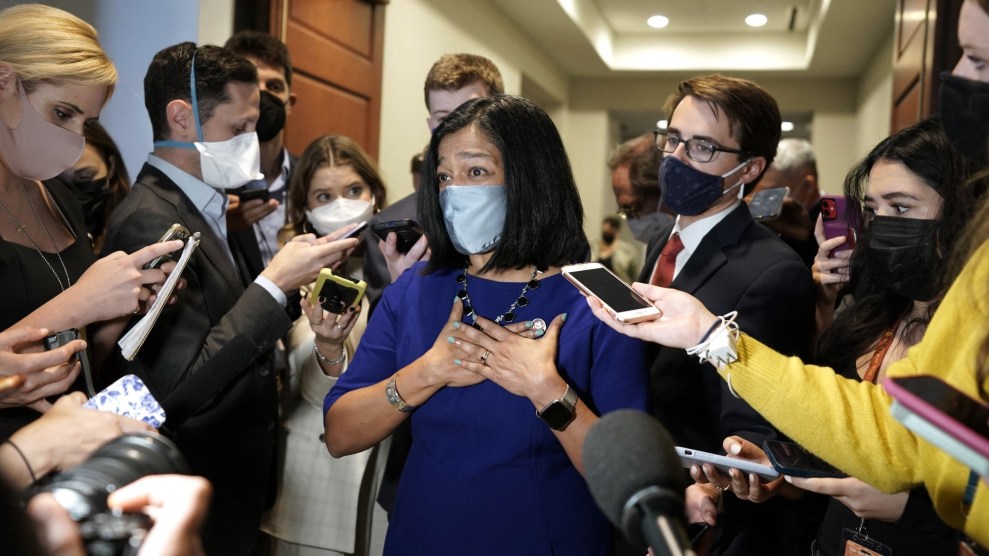
Congressional Progressive Caucus Chair Pramila Jayapal speaks to the media after the caucus met on October 28, 2021.Yuri Gripas/ ZUMA Press
Amid the lingering freakout over the process by which 30 House progressives signed—and then quickly withdrew—a letter asking President Joe Biden to tweak his Ukraine policy, it is easy to miss the politics.
Since Russia’s invasion, what can loosely be called the Democratic foreign policy establishment—lawmakers, pundits, and analysts who favor assertive use of US military might and weaponry abroad—have worked to mute dovish critics of Biden’s policies, shrinking the range of foreign policy views deemed acceptable among mainstream Democrats. When the progressive lawmakers caved on Tuesday, relatively hawkish Democrats scored a big win that cemented an emerging rule about what their colleagues should be willing to say: Calling for diplomacy with Vladimir Putin right now is outside the range of permissible opinions.
The letter originally emerged from a process designed to have the opposite impact. According a person involved, the effort was part of an ongoing collaboration among left-leaning think tanks and progressive Hill staffers hoping to create space on Biden’s left to push “antiwar” policies. The groups say they want to reduce the chances of nuclear war with Russia, which Biden himself, including in remarks earlier this month, has conceded are worryingly high. More generally, they want to push Washington’s policy makers to rely less on the military power after two decades of costly wars.
The language in the ill-fated letter was ultimately determined by staffers working for Rep. Pramila Jayapal, the Washington Democrat who chairs the Congressional Progressive Caucus. But according to people involved in the effort, the document was also promoted and circulated on Capitol Hill by analysts at two think tanks. One of those analysts was Marcus Stanley, the advocacy director for the Quincy Institute for Responsible Statecraft, which urges “military restraint and diplomatic engagement.” The other was Erik Sperling a former of Hill staffer who now serves as executive director of Just Foreign Policy, a small think that is critical of mainstream Washington foreign policy.
When Jayapal’s office released the letter to the Washington Post on Monday, it was immediately met with a storm of criticism from the progressive lawmakers’ own party. DailyKos founder Markos Moulitsas called letter signers “unbelievably naive and stupid” and said they were “making common cause with Lauren Boebert, Marjorie Taylor Green, JD Vance, and the rest of the MAGA crowd.” Massachusetts Rep. Jake Auchincloss (D-Mass.) tweeted that the letter is “an olive branch to a war criminal who’s losing his war.” Signatories soon began distancing themselves. Jayapal issued a statement Monday “clarifying” the letter. She sent out yet another statement on Tuesday, fully withdrawing the letter and faulting “staff” for having released it “without vetting.” A Jayapal spokesperson did not respond to Mother Jones’ inquiries.
In a statement Wednesday, Sperling defended the letter and faulted the reaction to it. “The shrill response to this utterly moderate letter exposes that war proponents are scared of an open debate about the range of potential approaches to address this escalating conflict,” he said. “The issue here is simply that, as happened during the Iraq War and other wars, those who oppose diplomacy want to use bad faith attacks to intimidate people out of having substantive debates about U.S. policy.”
Stanley said in an interview that the letter aimed to encourage Americans to question whether the United States can indefinitely pursue its current course of supporting maximal Ukrainian war aims without more assertive diplomacy. The ensuing backlash, he argued, was part of an effort by the national security establishment to prevent serious questioning of US policy.
“There is a line handed down, and this kind of policing of speech of whether or not you can disagree with that line,” Stanley said.
Other involved in circulating the letter emphasized that efforts to craft such documents and line up support from sympathetic members of Congress and other organizations are a standard and usually boring part of advocacy work in Washington, DC.
The letter itself read like it was written by a committee, because it was. It was deliberately milquetoast. It emphasized signatories’ agreement with Biden’s military support for Ukraine and with the “administration’s perspective that it is not America’s place to pressure Ukraine’s government regarding sovereign decisions.” It then offered a cautious suggestion: “As legislators responsible for the expenditure of tens of billions of U.S. taxpayer dollars in military assistance in the conflict, we believe such involvement in this war also creates a responsibility for the United States to seriously explore all possible avenues, including direct engagement with Russia, to reduce harm and support Ukraine in achieving a peaceful settlement.” That is as tough as it got. Two people involved with letter said that prior to its release, internal criticism came exclusively from people concerned it was too mild.
The much maligned timing of the letter’s release, two weeks before Election Day, was not driven by the impending election but rather by an earlier decision made by Jayapal or her staff to release it once it accumulated “a critical mass of signers,” a person involved said. The letter’s backers began gathering those signatures in late June. They continued through the summer, stalled during the August recess, and lined up more after Labor Day. Once 30 lawmakers had signed on, Jayapal’s press staff released it.
Jayapal—or the aides she threw under the bus—clearly erred by underestimating the sensitivities involved in releasing it so close to November 8, especially given that many Democrats are seeking to contrast their own all-out backing of Ukraine with House Minority Leader Kevin McCarthy’s recent statement that Republicans will not write a “blank check” for the war if they win back Congress. The call for diplomacy also seemed awkwardly timed, given recent Ukrainian gains, which have reduced calls among Democrats for immediate peace talks with Russia.
Many members who signed the letter were left complaining that that they had since changed their views and that no one had checked in with them before finally releasing it. (One person familiar with this process noted that since last year, Congress has used a system called Quill for electronically signing letters. After members sign a letter, the system automatically sends their offices updates when letters are updated or nearing release. Staff for the letter-signers presumably would have received notifications that it was set to go public, though they may not have read them.)
Timing in diplomacy is everything.
I signed this letter on June 30, but a lot has changed since then. I wouldn't sign it today.
We have to continue supporting Ukraine economically and militarily to give them the leverage they need to end this war. https://t.co/jEJlTK1hJI
— Congresswoman Sara Jacobs (@RepSaraJacobs) October 25, 2022
Rep. Jamie Raskin (D-Md.), in a nearly 900-word statement Tuesday, faulted the letter’s “unfortunate timing and other flaws.” But Raskin, according to a person familiar with the signature-gathering process, signed on September 21. He was one of the last members to do so. A Raskin spokesperson did not respond to inquiries.
Analysts who had helped gather support for the letter were left furious by the lawmakers’ sudden reversal. One think tank official pointed to an August Reuters/Ipsos poll that showed that 49 percent of Democrats agreed that “given the current economic crisis, the U.S. cannot afford to lend financial support to Ukraine.” (Polls on this topic swing substantially based on how questions are worded. In the same poll, 77 percent of Democrats agreed that “the U.S. must support sovereign countries when they are attacked by other countries.”)
“The Democratic Party,” this official said, “is telling a certain percentage of its voters: ‘You are not welcome in this party. You have no home in this party…If you don’t welcome this war, go to Trump.'”
On Monday, House Speaker Nancy Pelosi was in Zagreb, Croatia, representing the United States at the Crimea Platform, an international summit organized by Ukrainian President Volodymyr Zelenskyy. There, Pelosi endorsed Ukraine’s most ambitious war aim—the expulsion of Russia from Crimea, which Russian troops have occupied since 2014. That is unlikely to happen without a lot more war. And, critics argue, it would risk significant escalation. The people behind the letter believe the United States will likely have to convince Zelenskyy to give up this goal before any peace deal can be achieved. But Pelosi’s position is in line with US policy, and her presence at the summit—while progressives were being savaged for advocating for “engagement with Russia”—is a good indication of which way the wind is blowing.
In 2020, Donald Trump—who sometimes faulted US involvement in “endless wars”—agreed to pull US troops out of Afghanistan, and Vermont Sen. Bernie Sanders came close to becoming the most anti-war presidential nominee in a lifetime. In 2022, Trump finds it convenient to attack Biden for continuing his exit from Afghanistan. And Sanders, the only Senate member of the Progressive Caucus, said Wednesday that he does not agree with the progressives’ letter. Russia’s invasion of Ukraine led to strong backing by Americans for the Ukrainian cause and boosted domestic support for the NATO alliance. Washington, tracking voters, is getting more hawkish, especially when it comes to Ukraine.
The letter was a big political screw up. But the stomping the progressives are taking is about more than their faulty tactics. The colossal US failures in Iraq and Afghanistan damaged the credibility of the foreign policy establishment that critics derisively call “the Blob.” Now establishment Washington players in both parties—from Pelosi and Senate Minority Leader Mitch McConnell to hawkish policy analysts and columnists—are reasserting their power over national security, and over speech about it. After this week, progressives will surely find it harder to take foreign policy stances to Biden’s left, and not just on Ukraine. In primaries this year, pro-Israel groups enjoyed some success beating back a small increase in the willingness of progressive Democrats, including many signers of the Ukraine letter, to criticize Israel.
And as Rep. Ro Khanna (D-Calif.)—one of the few signatories who refused to back away from the letter—suggested to the New York Times, the blowback will likely reduce the already modest congressional will to check presidential use of US military power. “History shows that silencing debate in Congress about matters of war and peace never ends well,” Khanna said.
Some critics of the progressive letter have insisted that their main objection was its timing—that dissent is acceptable, just not right now. Still, the shushing matters. Some progressives are worried that US aid could unnecessarily extend the war in Ukraine. They may wonder if the US military should continue to guarantee the security of increasingly authoritarian NATO members like Turkey and Hungary. Many liberals are unhappy about Israeli settlement policy and the US role in arming Gulf state autocrats. But the takeaway from this week may be that in the Democratic Party, this is not the time to speak up.













